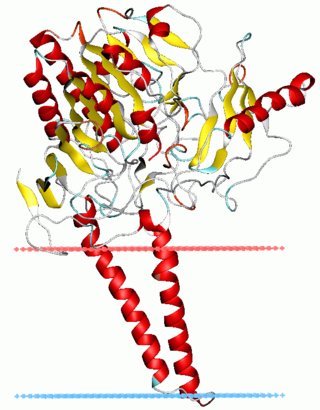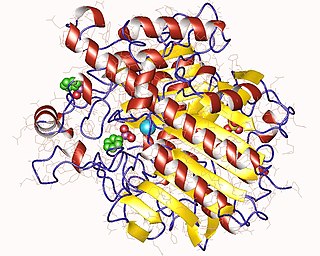
Cyclamate is an artificial sweetener. It is 30–50 times sweeter than sucrose, making it the least potent of the commercially used artificial sweeteners. It is often used with other artificial sweeteners, especially saccharin; the mixture of 10 parts cyclamate to 1 part saccharin is common and masks the off-tastes of both sweeteners. It is less expensive than most sweeteners, including sucralose, and is stable under heating. Safety concerns led to it being banned in a few countries, though the European Union considers it safe.

Cyclamic acid is a compound with formula C6H13NO3S.
Cerebroside-sulfatase (EC 3.1.6.8, arylsulfatase A, cerebroside sulfate sulfatase) is an enzyme with systematic name cerebroside-3-sulfate 3-sulfohydrolase. This enzyme catalyses the following chemical reaction

Sulfatases EC 3.1.6.- are enzymes of the esterase class that catalyze the hydrolysis of sulfate esters. These may be found on a range of substrates, including steroids, carbohydrates and proteins. Sulfate esters may be formed from various alcohols and amines. In the latter case the resultant N-sulfates can also be termed sulfamates.

Arylsulfatase (EC 3.1.6.1, sulfatase, nitrocatechol sulfatase, phenolsulfatase, phenylsulfatase, p-nitrophenyl sulfatase, arylsulfohydrolase, 4-methylumbelliferyl sulfatase, estrogen sulfatase) is a type of sulfatase enzyme with systematic name aryl-sulfate sulfohydrolase. This enzyme catalyses the following chemical reaction

N-acetylglucosamine-6-sulfatase (EC 3.1.6.14, glucosamine (N-acetyl)-6-sulfatase, systematic name N-acetyl-D-glucosamine-6-sulfate 6-sulfohydrolase) is an enzyme that in humans is encoded by the GNS gene. It is deficient in Sanfilippo Syndrome type IIId. It catalyses the hydrolysis of the 6-sulfate groups of the N-acetyl-D-glucosamine 6-sulfate units of heparan sulfate and keratan sulfate
In enzymology, a cyclohexylamine oxidase (EC 1.4.3.12) is an enzyme that catalyzes the chemical reaction
In enzymology, a 2'-hydroxybiphenyl-2-sulfinate desulfinase (EC 3.13.1.3) is an enzyme that catalyzes the chemical reaction

In enzymology, a N-sulfoglucosamine sulfohydrolase (EC 3.10.1.1), otherwise known as SGSH, is an enzyme that catalyzes the chemical reaction
In enzymology, an adenylylsulfatase is an enzyme that catalyzes the chemical reaction
In enzymology, a phosphoadenylylsulfatase (EC 3.6.2.2) is an enzyme that catalyzes the chemical reaction

The enzyme 3′(2′),5′-bisphosphate nucleotidase (EC 3.1.3.7) catalyzes the reaction
The enzyme choline-sulfatase (EC 3.1.6.6) catalyzes the reaction
The enzyme chondro-4-sulfatase (EC 3.1.6.9) catalyzes the reaction
The enzyme chondro-6-sulfatase (EC 3.1.6.10) catalyzes the reaction
The enzyme disulfoglucosamine-6-sulfatase (EC 3.1.6.1) catalyzes the reaction
The enzyme D-lactate-2-sulfatase (EC 3.1.6.17) catalyzes the reaction
The enzyme glycosulfatase (EC 3.1.6.3) catalyzes the reaction
The enzyme monomethyl-sulfatase (EC 3.1.6.16) catalyzes the reaction
In enzymology, a glucuronate-2-sulfatase is an enzyme that catalyzes the chemical reaction of cleaving off the 2-sulfate groups of the 2-O-sulfo-D-glucuronate residues of chondroitin sulfate, heparin and heparitin sulfate.







